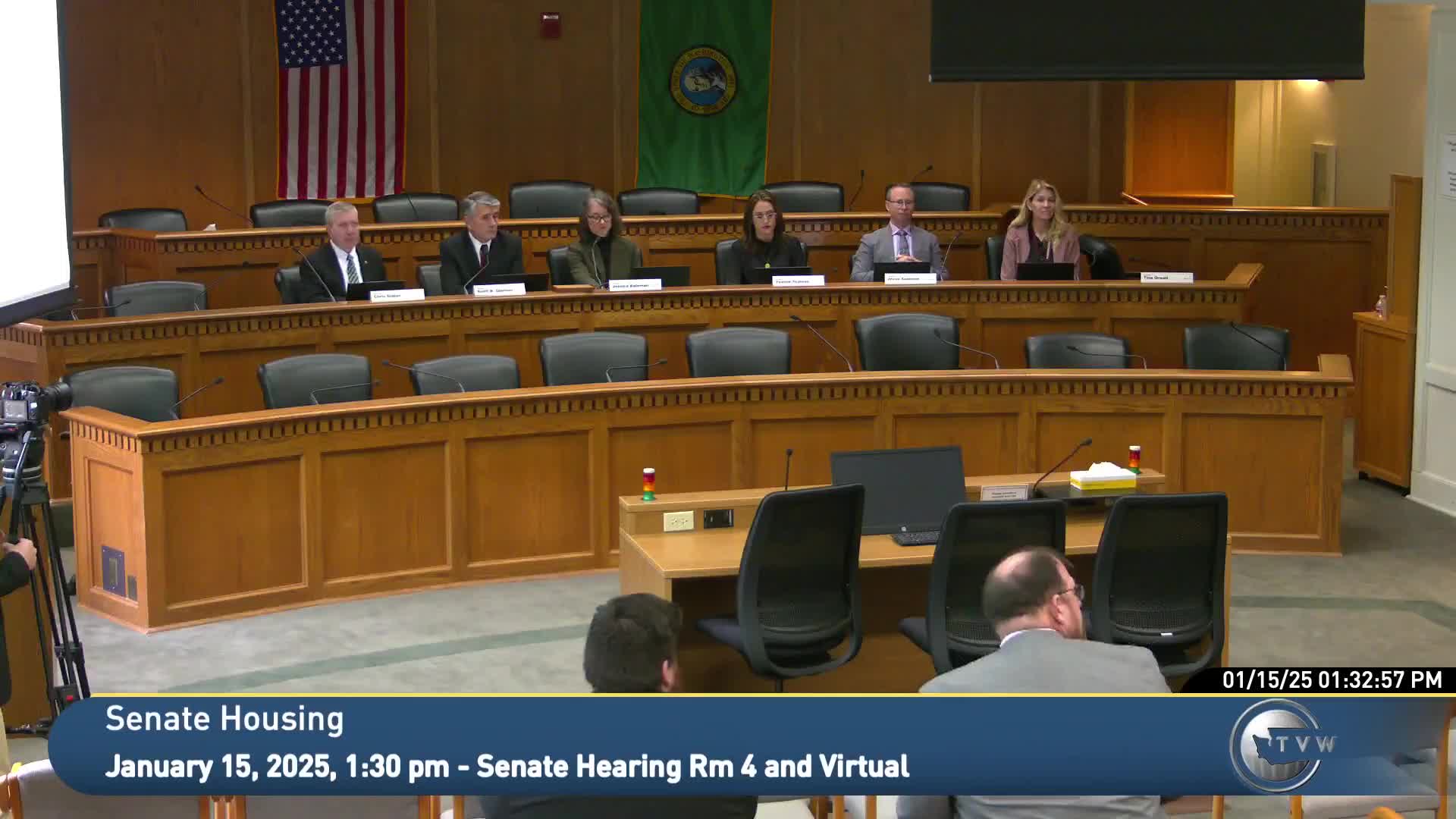Senate Housing Committee reviews SB 5129 to refine rules for common-interest communities
Get AI-powered insights, summaries, and transcripts
Subscribe
Summary
Lawmakers heard a staff briefing and public testimony on Senate Bill 5129, a multi-point update to Washington's common-interest community law that would adjust meeting rules, resale-certificate provisions, reserve-fund investment limits and exemptions for very small communities.
At the first Senate Housing Committee meeting of the 2025 legislative session, staff briefed members on Senate Bill 5129, a package of updates to Washington's common-interest community law intended to clarify how older homeowners associations and condominiums operate under the Uniform Common Interest Ownership Act.
The bill, explained Bill Fosbury, staff counsel to the committee, makes changes in several areas including which pre-2018 condo and homeowners-association statutes control where conflicts arise; voting and ballot procedures; when resale certificates may be waived; limits on boards'authority to block heat-pump installations; siting rules for electric-vehicle charging stations; and how associations may invest reserve funds. Fosbury summarized the bill: "Senate Bill 5129 concerns common interest communities." He told the committee some provisions would take effect Jan. 1, 2026, while the full transition to the Uniform Act remains scheduled for Jan. 1, 2028.
Why it matters: Common-interest communities (condominiums, cooperatives, planned-unit developments and homeowners associations) govern a growing share of Washington housing. The bill's changes would alter owners' rights and association administration, affecting resale transactions, day-to-day association processes and how associations steward long-term reserve funds.
Key items in the bill
- Statutory priority: The bill makes provisions of the Horizontal Property Regimes Act (residential condominiums created before July 1, 1990) and the Homeowners Association Act (associations created before July 1, 2018) controlling where they conflict with other statutes.
- Meetings and ballots: The bill would limit associations'ability to vary procedures for meetings held by telephone or video, require roll-call or verbal votes where a board votes, and require ballots to include space for write-in candidates. Secret ballots physically received at meetings must be counted without incumbent board members present.
- Resale certificates: The bill allows a buyer or seller to proceed when a resale certificate is "unavailable," under defined circumstances, giving parties a path to close transactions when an association cannot or does not produce a certificate in time.
- EV chargers and heat pumps: The bill would prohibit associations from restricting the installation of electric-vehicle charging stations in many single-family or site-condominium settings (except where the charger would occupy a common element) and bars boards from unreasonably withholding approval for unit-owner installation of heat-pump equipment on or in common elements.
- Reserve funds investments: Associations would be permitted to invest reserve funds and securities if the total value of reserve funds in interest-bearing accounts exceeds $250,000 and new investments would not reduce that threshold below 50% of reserves.
What witnesses said
Senator Jamie Petersen, the bill's prime sponsor, described months of stakeholder negotiation and said the bill tries to address concerns raised after last year's shift of older communities under the Uniform Common Interest Ownership Act. "The biggest things that this bill will do... is make the change to resale certificates so that we got agreement from everyone involved," Petersen said, adding that the bill reflects compromise among consumer advocates, attorneys, realtors and the Community Associations Institute.
Industry and stakeholder groups testified in support. Bill Clark of Washington Realtors said the organization "supports the bill" and welcomed the resale-certificate change and the revised exemptions for small communities. Teresa Torgerson, representing the Washington chapter of the Community Associations Institute (CAI) Legislative Action Committee, said CAI participated in interim stakeholder negotiations and supports the bill while reserving some continuing technical concerns. Steve Horvath of HOA United and John Kresge, speaking for Quimper Village Senior Cohousing, urged adoption; Kresge said his association already follows the bill's proposed investment practices and warned that forcing associations into federally insured accounts could erode long-term purchasing power for future repairs.
What the bill does not do (yet)
- The committee held a briefing followed by public testimony; there was no committee vote recorded in the transcript excerpt.
- Several stakeholders noted remaining technical issues that they asked the sponsor and staff to continue working on in follow-up meetings.
Next steps
The committee paused the briefing to hold a work session on housing development but reconvened to hear public testimony on SB 5129. Multiple witnesses said they intend to continue technical discussions with the sponsor and staff as the bill moves through the process.
Ending note
Committee staff provided a bill report and indicated no fiscal note had been requested for SB 5129 in the material distributed at the hearing; chair and members asked no substantive questions of staff after the briefing.
